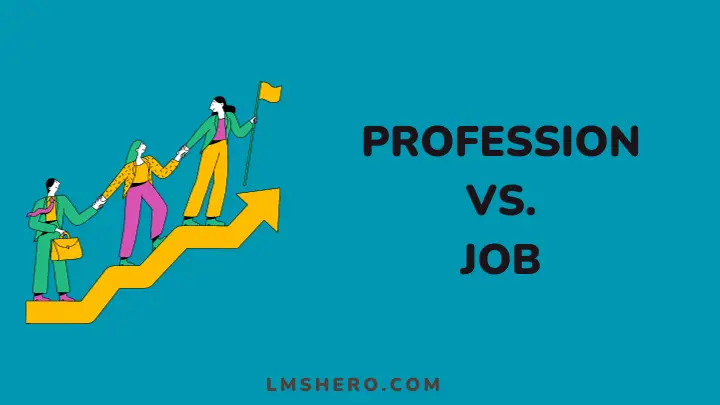In the vast landscape of career choices, two terms often surface: profession and job. To use these terms effectively, it’s crucial to understand the nuances that set them apart and the factors that make each unique.
Is it just a matter of semantics, or are there deeper implications for your career and personal growth? In this article, you will discover the similarities and differences between these two concepts.
You will also understand how they can affect your choices and opportunities in the work world. Looking for a new challenge, a change of direction, or a way to advance your skills and knowledge?
Understanding the distinction between a job and a profession can help you make informed decisions and achieve your goals.
Read on to find out more!
Understanding a profession and a job
Before embarking on this exploration, let’s establish a clear understanding of what constitutes a profession and a job.
A profession is a type of occupation that requires specialized knowledge, skills and training. It involves specialized education, training, and adherence to a code of ethics. On the other hand, a job is a specific role or position that a person performs for an employer or a client to earn a living.
Jobs may or may not demand specific qualifications and may involve tasks ranging from routine to complex. A profession and a job are not mutually exclusive, as one can have a job within a profession.
For example, being a lawyer is a profession, but being a corporate lawyer or a criminal lawyer are jobs within that profession. A profession usually has a higher status, income and autonomy than a job, but it also demands more responsibility, ethics and commitment.
Key differences between a profession and a job
Nature of work
Professions are occupations that require specialized knowledge and skills in a particular field. Professionals in these fields typically have advanced education or training and are expected to contribute to the development and progress of their respective industries.
On the other hand, jobs may encompass a wide range of tasks and responsibilities and may not necessarily require a high level of expertise or specialized knowledge.
While professions often demand a certain level of training and experience, jobs can be more accessible to individuals with varying levels of education and background.
Education and training
When it comes to selecting a profession, it is often necessary to undergo extensive education and training, which may even involve earning advanced degrees. While certain jobs may require specific skill sets, the educational requirements can differ considerably.
As such, it is crucial to carefully evaluate the educational prerequisites for any given profession before committing to it. This includes researching the necessary credentials and understanding the length and rigor of the training programs.
Additionally, it involves considering the financial and time investments required to achieve the desired qualifications. Making an informed decision about which profession to pursue can have significant implications for one’s career and financial future.
Therefore, it is essential to approach the decision with diligence and care.
Scope and opportunities
One of the main differences between a job and a profession is the scope and opportunities that each one offers. A job is usually a specific role or task that a person performs for a fixed period of time or salary.
A profession, on the other hand, is a broader field of expertise that requires specialized education, training, and skills. A profession also allows a person to pursue different career paths, advance in their field, and contribute to society in meaningful ways.
Similarities between a profession and a job
Commitment and dedication
Both a job and a profession require commitment and dedication from the individuals who pursue them.
Commitment means being loyal and faithful to one’s work, while dedication means being devoted and enthusiastic about one’s work.
These qualities are essential for achieving success and satisfaction in any career path, whether it is a job or a profession.
Importance in Society
The importance of both jobs and professions in society lies in their collective impact on the well-being, progress, and functionality of the community.
Each contributes uniquely, creating a symbiotic relationship that ensures a dynamic and thriving societal landscape.
Whether through the immediate services provided by jobs or the long-term contributions of professions, both are integral components of the societal fabric.
Income generation
Income generation stands as a shared facet between jobs and professions, serving as a fundamental motivator for individuals in both realms. In jobs, individuals receive compensation for their efforts, providing immediate financial support.
Professions, with their specialized skills, often lead to higher earning potential over time. Both contribute to personal financial stability and societal economic growth. The common thread lies in the pursuit of livelihood.
Jobs offer immediate income, and professions provide a pathway to long-term financial success. This similarity emphasizes the universal need for economic sustenance, making income generation a pivotal aspect shared by both a job and a profession.
Can a job be a profession and vice-versa?

While the terms “job” and “profession” often refer to distinct categories, there can be instances where a job evolves into a full-fledged profession and vice versa. A job is typically considered a specific role undertaken for remuneration, with varying skill requirements.
As individuals acquire specialized knowledge and skills within a job, they may transition into a profession. This profession is marked by a higher level of expertise, formal education, and ethical considerations.
Conversely, a profession, in certain scenarios, can be simplified into a job when the complexity of tasks decreases.
FAQs
How does a profession differ from a job?
A profession involves specialized knowledge and often requires extensive education. In contrast, a job may encompass a broader range of roles with varying skill requirements.
What factors should one consider when choosing a profession?
Consider personal goals, values, career prospects, and desired work-life balance when making decisions about job opportunities.
Can a job lead to a fulfilling career?
Yes. Strategic career moves, dedication, and continuous learning can turn a job into a fulfilling and successful career.
Is it possible to switch from a job to a profession?
Yes. With careful planning and acquiring the necessary qualifications, one can transition from a job to a fulfilling and meaningful profession.
Are professions more stable than jobs?
While some professions offer stability, it varies. Job stability depends on factors like industry trends, company health, and individual performance.
How does societal perception influence career choices?
Societal perception can influence career choices by shaping perceptions of prestige associated with certain professions or jobs.
Conclusion
In conclusion, a job and a profession are not the same thing, but they are also not mutually exclusive. A job is any paid work that you do, while a profession is a specialized and regulated field that requires formal education and training.
A profession usually offers more autonomy, prestige, and opportunities for growth than a job, but it also comes with more responsibilities and expectations. A job can be a stepping stone to a profession, or it can be a way to balance your personal and professional life.
The choice between a job and a profession depends on your goals, values, and circumstances. The most important thing is to find work that is meaningful, fulfilling, and rewarding for you.
By understanding the distinctions, weighing the pros and cons, and aligning choices with personal values, individuals can embark on a fulfilling career path. Whether you choose a profession or a job, remember that both contribute significantly to our society.
You can also learn more about the difference between the working class and the middle class.
Thanks for reading.







